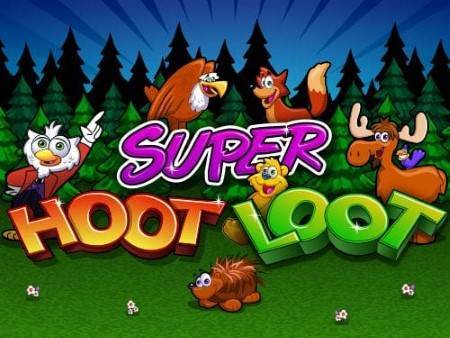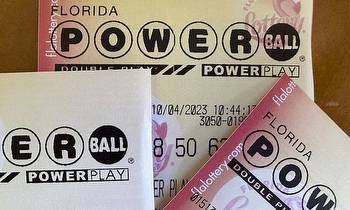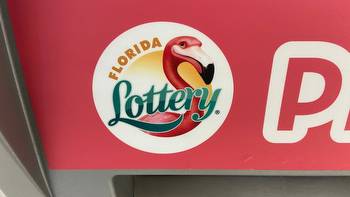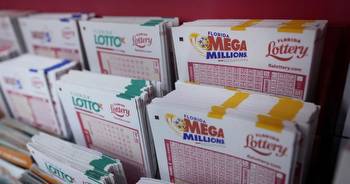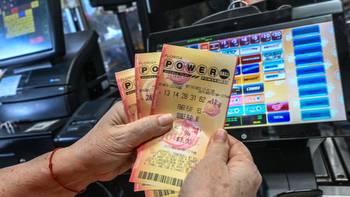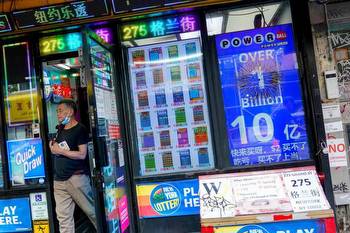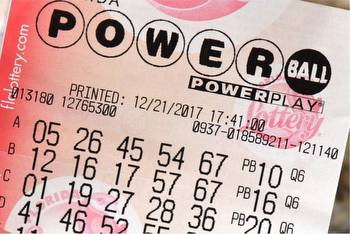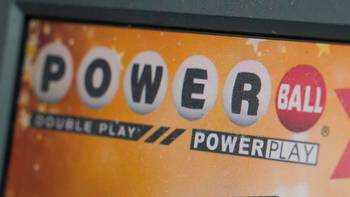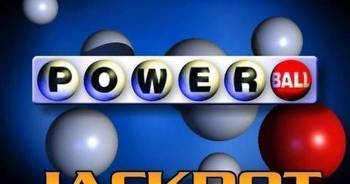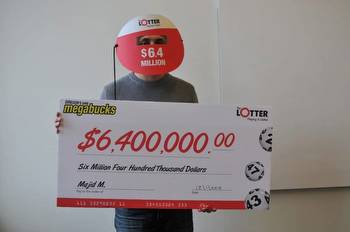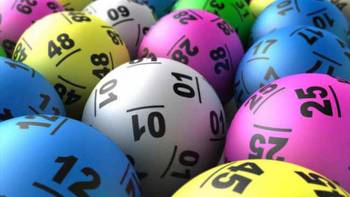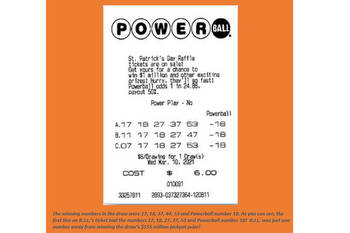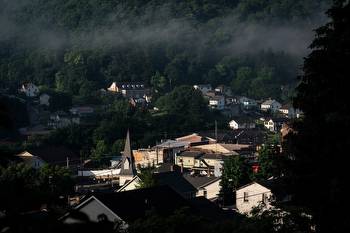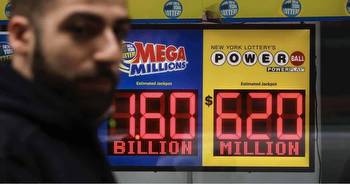Who won? Small town abuzz as winner of $731M Powerball jackpot remains a mystery

LONACONING, Md. (AP) — There haven’t been a lot of big wins in this little town tucked between gentle green mountains in Maryland’s far western reaches. Coal brought work, then took it away. The railroad meant prosperity, then stopped running. They made glass here, and then they didn’t.
These days, the line of cars at the First Assembly of God food giveaway is so long that the volunteers split each box into two smaller portions to feed more families.
But over the past few weeks, Lonaconing — the locals call it “Coney” — has acquired a new shine, a glint of gold in iron country. Sometime in late January, someone bought a Powerball lottery ticket at the Coney Market, and that ticket’s six numbers won the big one — $731 million, the biggest jackpot ever in Maryland and the fifth-richest payout in U.S. history.
That someone lives in Lonaconing, according to the mayor and the owner of the market. But because Maryland is one of seven states that allows lottery winners to remain anonymous, and because the winner is no fool, the identity of that someone isn’t public.
The fact that someone in this town of 1,200 people (just 400 families, actually, down by half over the past 50 years) is suddenly Midas-rich has caused some strange things to happen.
An anonymous letter circulated naming a 76-year-old grandfather of seven and his longtime partner as the winners. Besieged with requests for free money, they denied being sudden multimillionaires.
Gold diggers poured into town. People showed up from Georgia and Ohio and Arkansas, asking for a piece of the prize to care for an ailing relative, or to save their struggling farm, or to pay for that European trip they’ve yearned to take.
A woman in Georgia wrote to the owner of Coney Market asking him to buy her a couple of chain saws for her farm. Another supplicant wanted a piece of the lottery winnings to get her driveway paved.
“They say, ‘If you don’t ask, you don’t get,’” said the guy being asked, Richard Ravenscroft, who owns the market. “People don’t know the winner’s name. I’m the person whose name they do know, so they ask me.”
People from thousands of miles away have sent money in envelopes asking the market staff to send them lottery tickets from the lucky shop. (Lottery sales at the market, usually a modest $4,000 a week, briefly soared, then returned to earth, Ravenscroft said.)
Out-of-towners drove through the mountains to bet the very same set of numbers that the big winner had wagered on: 40, 53, 60, 68, 69 and Powerball 22. (Some folks in town thought the winning numbers might be the ages of the winner’s family. No: The jackpot combination was a random set of numbers selected by the lotto machine.)
A man from Northern Virginia showed up to ask Ravenscroft to reissue a purportedly winning lottery ticket that the man had lost. The man stayed in the shop for an entire day, and state police had to stop by to make sure things didn’t get too crazy.
It’s not just outsiders making a fuss about the big money. People up and down Main Street are eager — “some are pretty impatient about it,” says Debbie Bennett, Coney Market’s manager — for the winner to donate a pile of cash to improve life in a town where the poverty rate of 24 percent is more than double the statewide number.
The No. 1 need, many say: Clean up the “Coney water,” the local name for the skanky H2O that sometimes bubbles up from underground right into people’s basements. “Mine water,” some call it, rising from old coal shafts into the houses of people whose fathers once worked those tunnels.
Or: Fix the streets. Help the struggling shopkeepers. Put some cash in the pockets of seniors who can’t get by on $500 a month in Social Security.
But the first thing on most minds is the simplest question of all: Who won? The golden ticket was purchased in January, and the winner — winners, actually; it’s a group of unknown size that calls itself the “Power Pack” — claimed the award in late May. (The $731 million will end up being $367 million because the winners chose a lump-sum payment rather than 30 years of installments, plus the feds and the state take a hefty share as taxes.)
By now, many people think there ought to be some sign that someone has come into a substantial chunk of change.
“Everyone is still, ‘Who is it?’” said Bob Fazenbaker, 67, who’s retired from the auto parts store up the road from the market.
“We think it’s the person who keeps saying that’s not who it is,” said Bennett, the market manager. “If it’s who people think it is, they’ve had a lot of visitors on their property lately. They’ve been going around different places, casinos, spending money at Rocky Gap and Nemacolin.”
Some people say they’ve noticed a new car or two at one house or another. Some people point to someone who’s spruced up the front of the house. Some people profess not to care, but they seem to be outnumbered by people who say they know for sure who won.
On the other hand, Bennett said, “We all could be wrong.”
Happily, a number of people in Coney who definitely did not hit the Powerball jackpot nonetheless feel like winners.
At the market, employees are a little bit flusher. The Maryland Lottery bestows a $100,000 bonus upon the store that sells the winning ticket, and Ravenscroft, the owner, “gave us girls some of the money, all 11 of us,” Bennett said.
Depending on how many hours they work, they got anywhere from a few hundred dollars to a couple thousand.
Ravenscroft put the biggest share of the bonus into expanding the market — a new kitchen and a bigger seating area for folks to try the new menu item (ham salad, joining tuna salad and chicken salad among the sandwich offerings).
But some of the new equipment just sits in the store, waiting until the owner can find workers to put it all together.
“We can’t find nobody to work because everybody’s staying home collecting unemployment,” Bennett said.
The mayor, John Coburn, says Lonaconing is a winner because the jackpot “put the town on the map,” bringing in visitors, generating worldwide publicity.
Coburn, who owns the florist shop and the pizza place on the same street in this one-traffic-light town, has gotten a firsthand taste of people’s passion for free money: Strangers kept calling his stores, asking — even demanding — that the mayor give them some of the winnings.
“We heard from homeless shelters, refugee centers, people wanting to build a church,” he said. “People asked me for a new car. I tried to be polite, but I had to say, ‘Please stop calling.’ It really showed me a different perspective on people with an entitlement, that they somehow deserve some of that money.”
Alas for Lonaconing, its government won’t get a penny from the lottery because Coney Market, a barn-red emporium right at the entrance to town, actually sits one block outside the city limits, so the share the state gives to the local government where the ticket was sold — a windfall of several million bucks, the mayor says — will go instead to Allegany County.
At the store, things are slowly returning to normal. The parade of out-of-towners asking for free cash has thinned, Ravenscroft said, though some still show up with letters they want him to pass to the lottery winner.
“I throw them in the trash,” he said.
Lonaconing’s needs remain acute, so great that some residents say even a most generous lottery winner couldn’t turn things around.
“The coal mine closed, then the timber left, then the train left, and everything was gone,” said Robert Lee Fazenbaker, an 84-year-old retired miner, railroad man and furnace operator who saw each of his careers vanish. He’s been getting by mainly on Social Security and the federal government’s covid relief payments, and he’s worried about what happens when they stop. But he doesn’t want anything from the lottery winners. As he sees it, somebody got lucky. Good for them, he says. They don’t owe us anything.
“Trump gave us money; Biden gave us some, too,” he said. “Okay, good, but there’s still no jobs. We can’t all win the lottery.”
Nearly everyone in Lonaconing who thinks they know who won names the same couple, Wilbur Miller and Nancy Winebrenner.
“They’re good people, and they deserve it, and we’re happy for them,” said Bennett, the store manager.
“Everybody respects them,” said Gloria Cooper, who manages the food giveaway at the church. “They’re very private, and nobody resents them.”
The anonymous letter that made its way around town named the couple. The mayor was quoted in a local paper embracing the theory.
Whereupon Miller and Winebrenner were besieged with requests for cash, gifts, charitable donations and meetings.
It got to the point that they felt they couldn’t leave their house. They asked the authorities for help. They hired a lawyer to look into the harassment. Finally, they wrote a letter to the local paper, the Cumberland Times-News.
“We are writing to clear up a rumor that has circulated about the winners of the Maryland Powerball for $731 million,” Miller and Winebrenner wrote. “Sadly enough, we are not the winners of this drawing. We do not have this ticket!”
The couple suggested that “everyone take a better look in your glove boxes, consoles of your cars or the pockets in your coats. Who knows, maybe you are the ticket holder.”
The letter continued: “We have no idea how this false rumor started, but we are writing this so it will stop.”
It did not.
But it should, the mayor says, because he knows that Miller — who did score $10,000 last year on a scratch-off lottery ticket that he bought at Coney Market — cannot be the big winner.
The proof: On the May afternoon when the winner traveled to Baltimore to claim the award, “Wilbur was with me all that afternoon,” Coburn said. “He didn’t leave town. He’s not the guy.”
Miller and Winebrenner did not reply to requests for comment, but the mayor said the tales told about his longtime friend are bogus. Yes, Miller has gone to casinos, but “he’s always done that, before and after the lottery,” Coburn said. No, Miller hasn’t altered his lifestyle; in fact, he still works every day — he’s a truck driver, collecting metal and hauling it to the junkyard.
Some people don’t buy the denials.
Miller and Winebrenner “used to come get food — no more,” Cooper said.
Still, sure as she is that they’re the winners, Cooper says the new millionaires shouldn’t feel any obligation to support the rest of Lonaconing. As a steady stream of cars arrive to pick up boxes of sweet potatoes, onions, apples, squash and cucumbers, people talk more about being grateful for what they have than about wanting or deserving anything from the Power Pack.
“We love the Lord,” Cooper said, “and He sends us what we need. And President Trump sent us cheese and milk and hot dogs — the Democrat just sends us vegetables. President Trump put a letter in each one of these boxes saying he’s thinking of us. People kept those notes from President Trump, put them up on their walls. That’s who people depend on, not the Powerball winner.”
Around town, people still trade clues. Idle gossip, says the mayor.
Back at the market, Ravenscroft arrives with money from the bank so his cashiers can make change, then picks up sandwiches to deliver them to the school — lunch for the teachers.
He has a theory about the winner’s identity, but he’s not naming names. The person he suspects used to come into the shop to buy lottery tickets ahead of every drawing. The person hasn’t been back since the big one.
A steady stream of people enter the market to buy their shot at a different life. A sign on the front window shows the latest Powerball jackpot tally: $20 million.
The winner can’t hide forever, Ravenscroft figures. Win millions, and you’re going to want to spend some of it. Then the pressure from friends and family and neighbors and gold diggers will become impossible.
“We’ll find out who the winners are,” the shopkeeper says, “when they quietly move away.”







